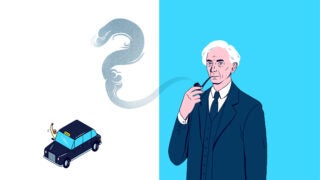Pulitzer Prize Winner Reflects on Misconceptions About Refugees
Viet Thanh Nguyen explores how the world views refugees—40 years after he arrived in America as one himself.
USC’s Viet Thanh Nguyen writes about identity, politics, social justice and Asian-American culture, but it’s not just a scholarly passion—it’s personal. Nguyen and his family were among the millions of boat people who fled Southeast Asia during the Vietnam War in the mid-1970s. After a stint in a Pennsylvania refugee camp, they started new lives in San Jose, California. Nguyen’s experiences inspired his nonfiction book Nothing Ever Dies: Vietnam and the Memory of War and his novel The Sympathizer, which earned the Pulitzer Prize for fiction in April. An associate professor of English and American studies and ethnicity at the USC Dornsife College of Letters, Arts and Sciences, Nguyen recently talked with writer Rachel Ng about how our perception of refugees shapes our world and ourselves.
Do you identify more as American or Vietnamese?
I just wrote an essay for Time magazine, and the opening lines of that essay are “I am an immigrant. I am also a human being, an American, a Vietnamese, an Asian and a refugee.” I’m all those things at once. I think that’s absolutely a crucial decision for me because we live in a society where people are pressured to choose their identities. Especially for Asian-Americans, we’ve grown up in a society that often makes us decide whether we’re all American or whether we’re Asian. That’s a false choice, so we have to rebel and proclaim that we can be many things at the same time.
Why are Americans often suspicious of refugees?
Refugees bring with them these histories that make potential host countries uncomfortable…. The reason they became refugees is what we ourselves might have had a hand in. Refugees are a living reminder that the things we take for granted—the safety of our homes, the safety of our country—are fragile. We see other countries being afflicted by war or natural disaster from a distance, and we assume that can’t happen to us, but if those refugees start coming to our shores, then they become these living reminders.
What is the biggest misconception about war refugees?
Perhaps the biggest misconception is that refugees are only victims. People see these horrible images: The Syrian boy face down on the beach in Turkey has now become iconic. That image made me physically ill in a way I have not felt in a long time. It reminded me of the fact that the Vietnamese were portrayed in the same way. It led to the perception that poor Vietnamese people are victims. Of course, they were. The Syrian people, including that boy, are victims. But that doesn’t define them. The idea that refugees are victims simply becomes a way of not sympathizing with them. We continue to treat them as less than humans. If you see people only as victims and therefore as less than human, they’re still not the same as you are.



